The role of a Program Manager is fundamental in ensuring that projects are delivered on time, within budget, and to the required quality standards. They coordinate and manage complex projects across multiple teams, aligning business goals with technology solutions.
Key skills for a Program Manager include strong leadership, strategic planning, and excellent communication abilities. Additionally, they must be adept at risk management and resource allocation to effectively guide projects from inception to completion.
Candidates can write these abilities in their resumes, but you can’t verify them without on-the-job Program Manager skill tests.
In this post, we will explore 9 essential Program Manager skills, 11 secondary skills and how to assess them so you can make informed hiring decisions.
Table of contents
9 fundamental Program Manager skills and traits
The best skills for Program Managers include Project Planning, Risk Management, Budgeting, Stakeholder Communication, Resource Allocation, Quality Assurance, Change Management, Performance Tracking and Contract Management.
Let’s dive into the details by examining the 9 essential skills of a Program Manager.
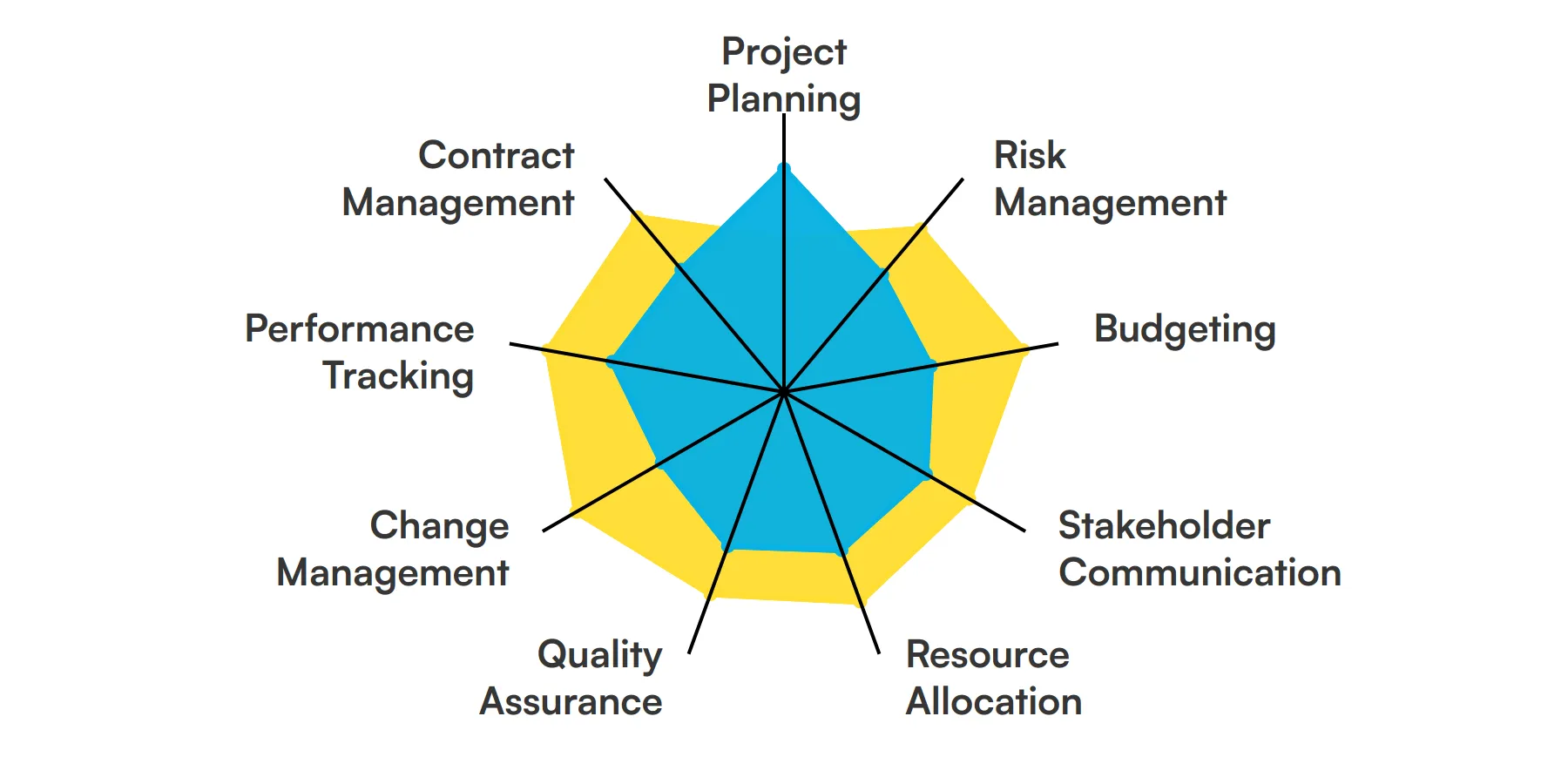
Project Planning
Project planning involves defining project goals, setting timelines, and allocating resources. A program manager uses this skill to ensure that all project components are aligned and progressing towards the overall objectives.
For more insights, check out our guide to writing a Project Manager Job Description.
Risk Management
Risk management is about identifying potential risks and developing strategies to mitigate them. Program managers need this skill to anticipate issues and implement solutions before they become major problems.
Budgeting
Budgeting involves planning and controlling the financial resources of a project. Program managers use this skill to ensure that projects are completed within financial constraints, avoiding cost overruns.
Stakeholder Communication
Effective stakeholder communication ensures that all parties are informed and engaged. Program managers use this skill to keep stakeholders updated on project progress and to manage their expectations.
Resource Allocation
Resource allocation is about distributing resources efficiently to meet project goals. Program managers need this skill to ensure that team members and materials are used optimally.
Quality Assurance
Quality assurance involves monitoring project deliverables to ensure they meet the required standards. Program managers use this skill to maintain high-quality outputs and client satisfaction.
Check out our guide for a comprehensive list of interview questions.
Change Management
Change management is the process of guiding teams through organizational changes. Program managers use this skill to help teams adapt to new processes, tools, or project scopes.
Performance Tracking
Performance tracking involves monitoring project progress and team performance. Program managers use this skill to identify areas for improvement and ensure that project milestones are met.
Contract Management
Contract management involves overseeing agreements with vendors and partners. Program managers use this skill to ensure that all contractual obligations are met and to manage any issues that arise.
11 secondary Program Manager skills and traits
The best skills for Program Managers include Technical Proficiency, Conflict Resolution, Time Management, Negotiation, Data Analysis, Documentation, Team Building, Presentation Skills, Vendor Management, Agile Methodologies and Customer Focus.
Let’s dive into the details by examining the 11 secondary skills of a Program Manager.
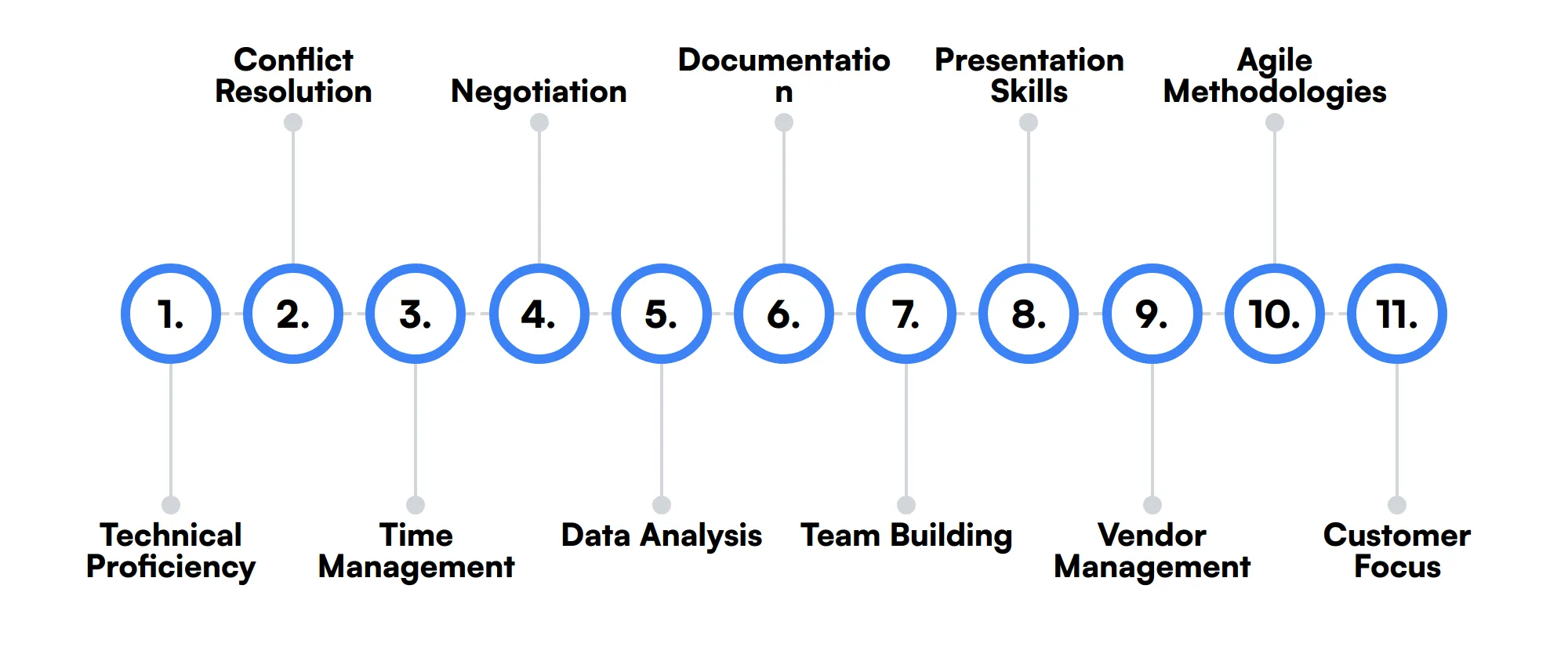
Technical Proficiency
Having a good understanding of the technical aspects of the projects helps program managers communicate effectively with their teams and make informed decisions.
Conflict Resolution
Conflict resolution skills help program managers address and resolve disputes within the team, ensuring a harmonious working environment.
Time Management
Time management is crucial for meeting deadlines and ensuring that project tasks are completed on schedule. Program managers use this skill to prioritize tasks and manage their workload.
Negotiation
Negotiation skills are important for securing resources, managing stakeholder expectations, and resolving conflicts. Program managers often negotiate with vendors, clients, and team members.
Data Analysis
Data analysis involves interpreting project data to make informed decisions. Program managers use this skill to track progress, identify trends, and adjust strategies as needed.
Documentation
Documentation skills are essential for maintaining accurate records of project activities, decisions, and changes. Program managers use this skill to ensure transparency and accountability.
Team Building
Team building involves creating a cohesive and motivated team. Program managers use this skill to foster collaboration and ensure that team members work well together.
Presentation Skills
Presentation skills are important for communicating project updates and proposals to stakeholders. Program managers use this skill to convey information clearly and persuasively.
Vendor Management
Vendor management involves overseeing relationships with external suppliers. Program managers use this skill to ensure that vendors meet their commitments and deliver quality products or services.
Agile Methodologies
Understanding agile methodologies helps program managers implement flexible and iterative project management practices, which can lead to more efficient project delivery.
Customer Focus
Customer focus involves understanding and meeting the needs of the client. Program managers use this skill to ensure that project outcomes align with client expectations and requirements.
How to assess Program Manager skills and traits
Assessing the skills and traits of a Program Manager can be a challenging task, given the multifaceted nature of the role. From project planning and risk management to budgeting and stakeholder communication, a Program Manager must excel in various domains to ensure the success of multiple projects simultaneously.
Traditional resumes and interviews often fall short in providing a comprehensive view of a candidate's capabilities. Skills-based assessments offer a more reliable way to evaluate a Program Manager's competencies. These assessments can help you understand how well a candidate can handle resource allocation, quality assurance, change management, performance tracking, and contract management.
To streamline this process, Adaface on-the-job skill tests can be incredibly useful. These tests not only help in reducing screening time by 85% but also ensure a 2x improved quality of hires. By leveraging such assessments, you can make more informed hiring decisions and find the best fit for your program management needs.
Let’s look at how to assess Program Manager skills with these 5 talent assessments.
Project Management Test
Our Project Management Test evaluates a candidate's ability to oversee projects from start to finish, ensuring they can handle timelines, budgets, and stakeholder interactions effectively.
The test assesses skills in designing project plans, managing resources, and stakeholder management. It also covers both agile and traditional project management methodologies, providing a comprehensive evaluation of a candidate's project management capabilities.
Candidates who perform well on this test demonstrate strong capabilities in risk analysis and creating detailed project reports, essential for successful project delivery.
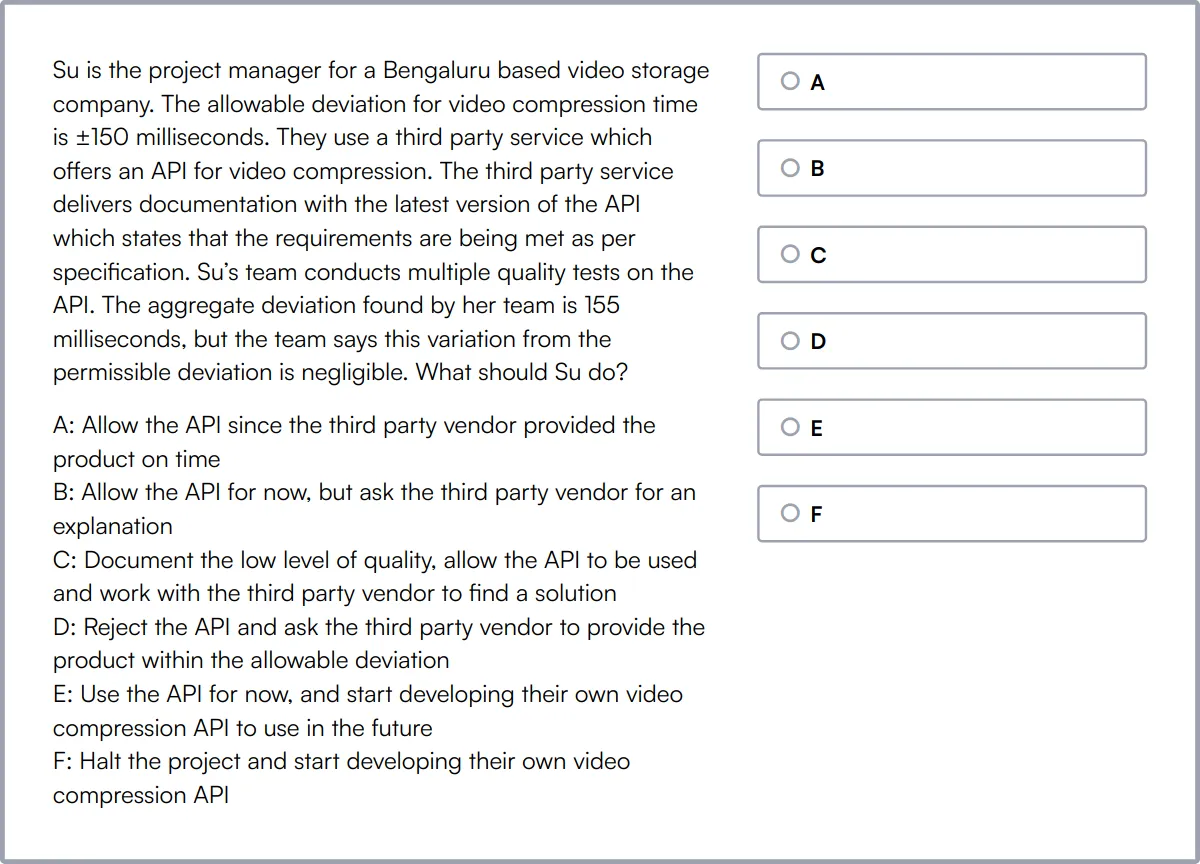
Scrum Master Test
The Scrum Master Test measures a candidate's understanding of the Scrum framework and their ability to effectively apply agile practices in project management.
This test covers key areas such as sprint planning, user stories, daily stand-ups, and Scrum roles, ensuring candidates are well-versed in the essentials of Scrum.
High-scoring individuals are proficient in managing Scrum events and artifacts, which are critical for maintaining the flow and success of agile projects.
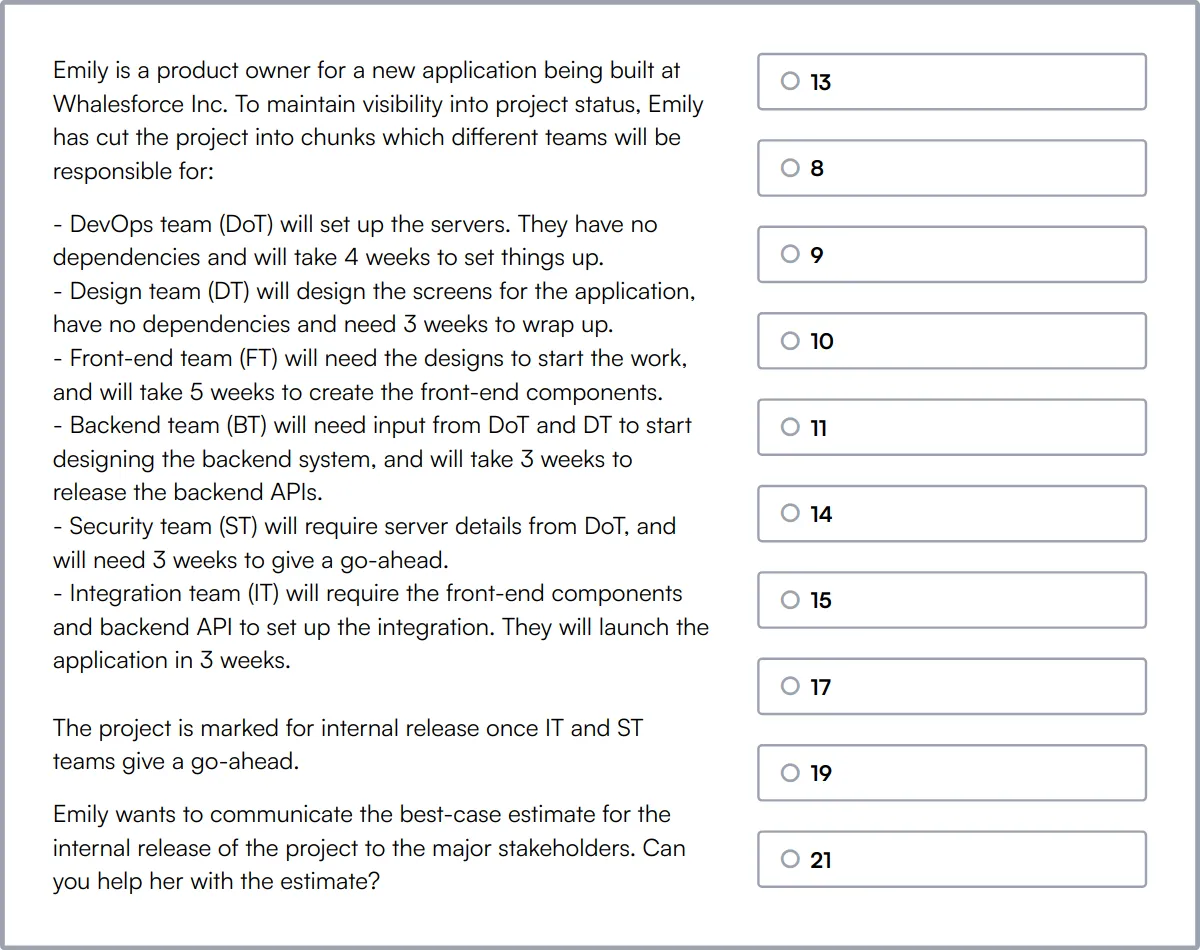
Financial Accounting Online Test
Our Financial Accounting Online Test assesses a candidate's expertise in financial reporting and accounting standards, crucial for accurate financial analysis and decision-making.
The test evaluates knowledge in areas such as financial statements, double-entry bookkeeping, and financial ratios, providing a thorough understanding of accounting principles.
Successful candidates will demonstrate a strong ability to analyze financial data and apply accounting rules effectively, ensuring compliance and accuracy in financial reporting.
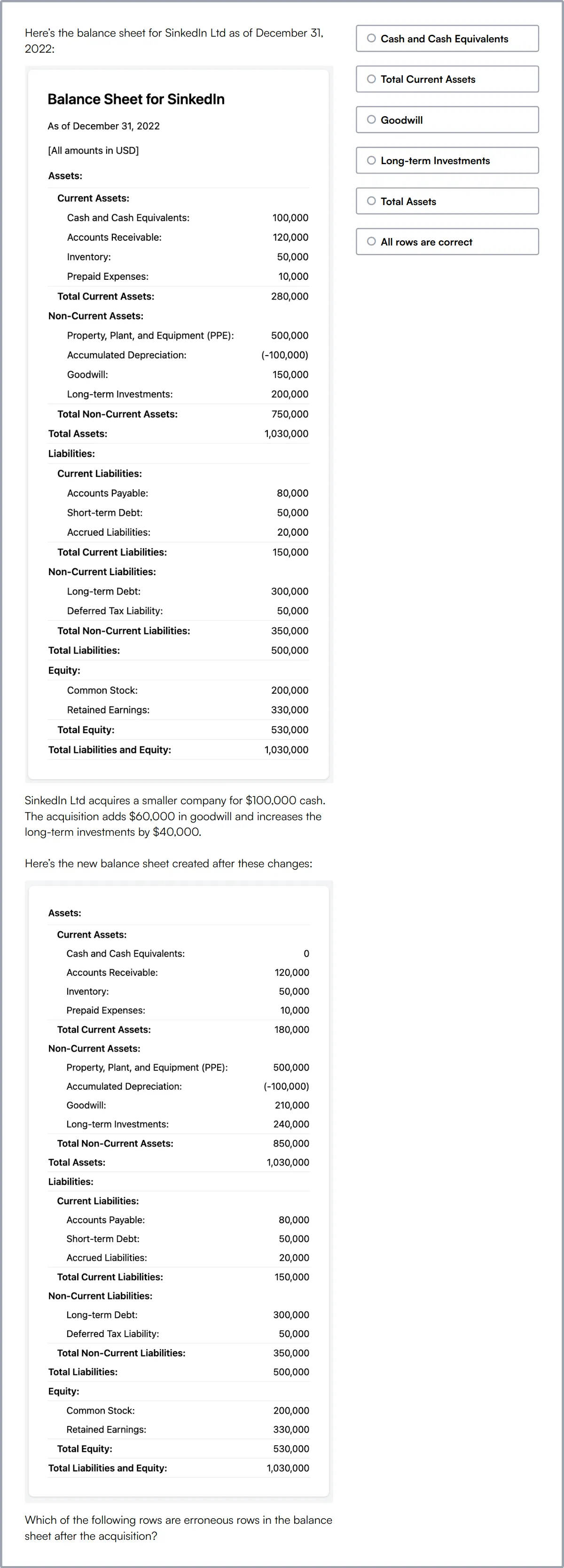
Communication Skills Test
The Communication Skills Test evaluates how well candidates convey and interpret messages, which is key for effective collaboration and stakeholder management.
It assesses verbal reasoning, critical thinking, and situational judgement, focusing on a candidate's ability to handle real-world communication scenarios.
Those who excel in this test are adept at both verbal and written communication, crucial for clear and effective interactions in any professional setting.
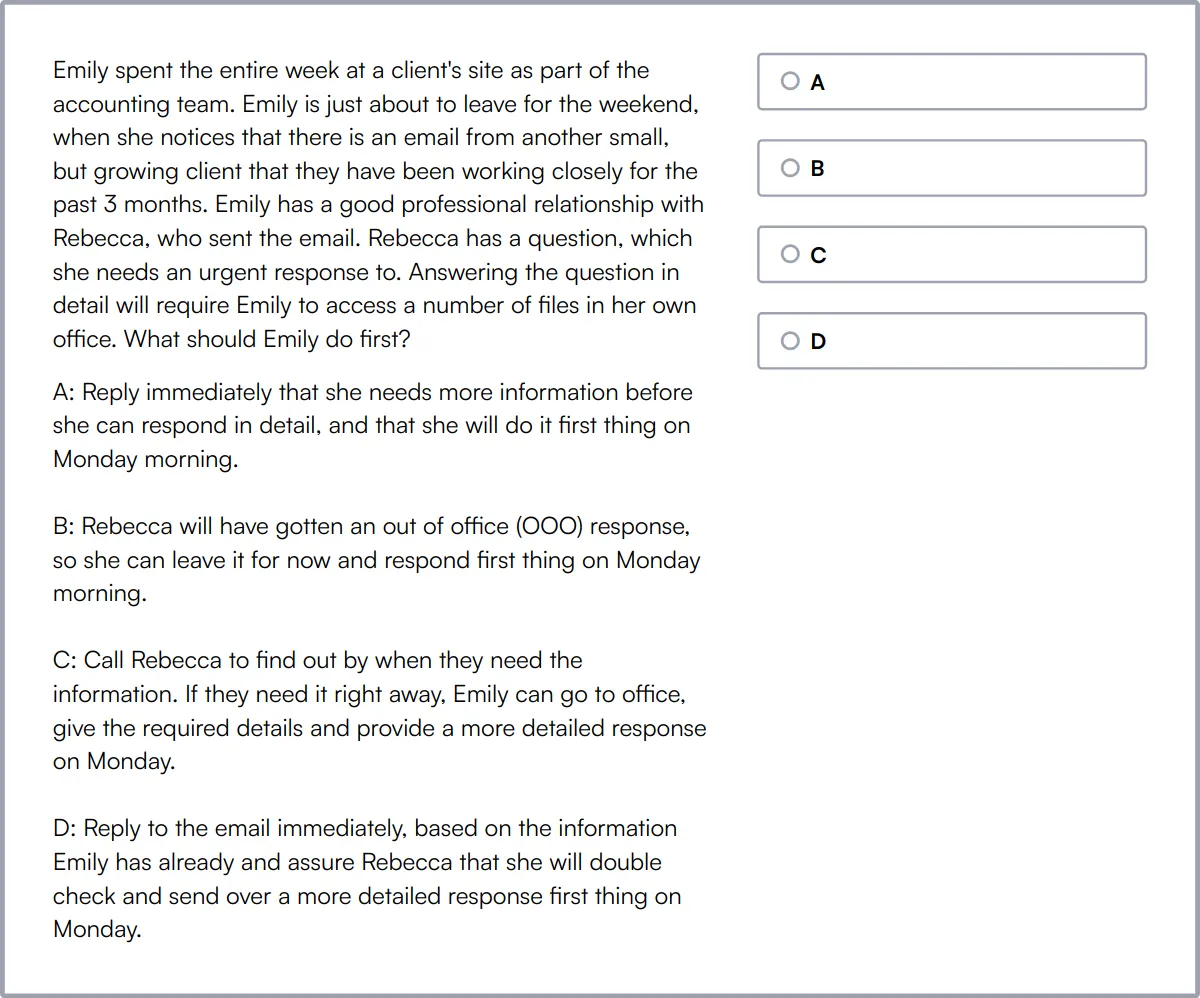
QA Engineer Test
Our QA Engineer Test is designed to evaluate a candidate's proficiency in quality assurance practices and their ability to maintain high software quality standards.
The test covers essential QA skills such as test design techniques, software life cycle knowledge, and the use of tools like Selenium and Linux for testing.
Candidates scoring well on this test are proficient in identifying and solving quality issues, ensuring the reliability and performance of software products.
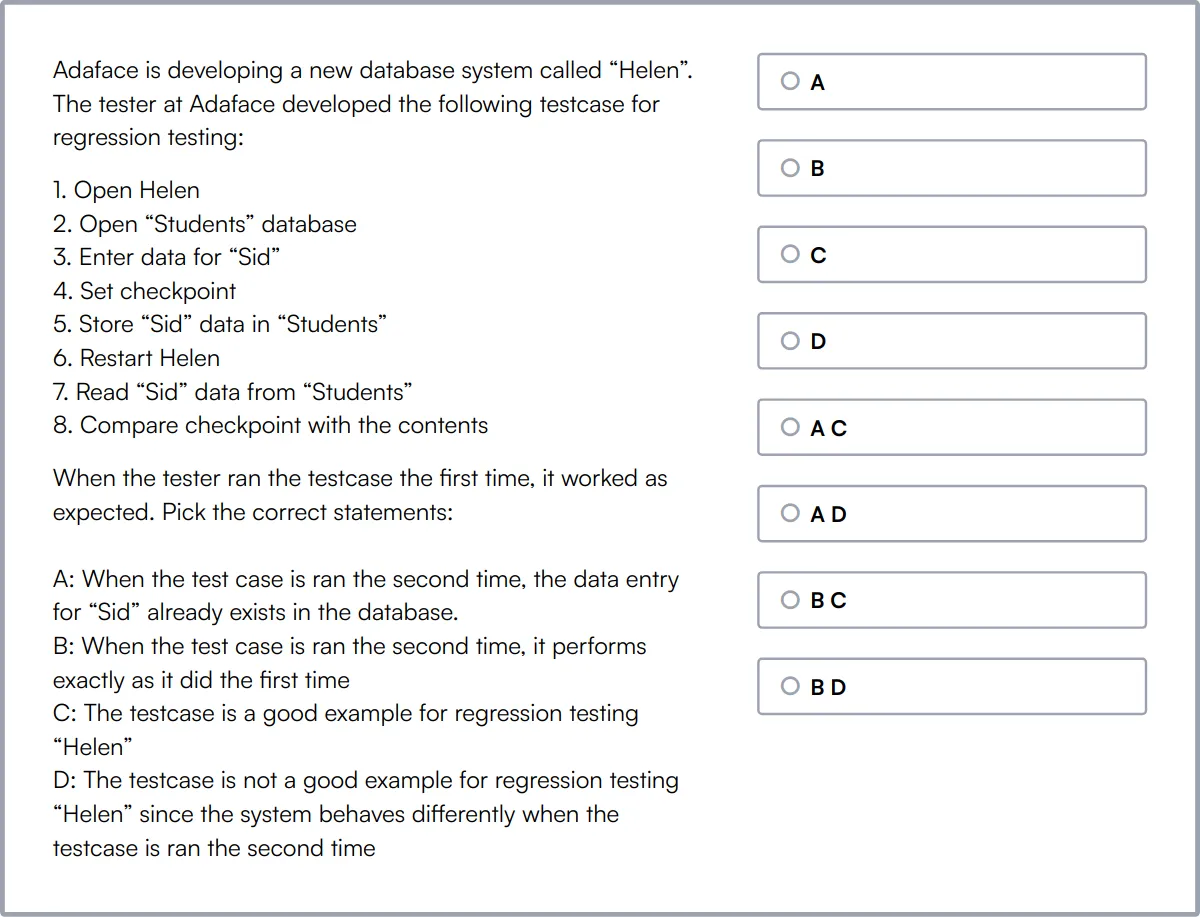
Summary: The 9 key Program Manager skills and how to test for them
| Program Manager skill | How to assess them |
|---|---|
| 1. Project Planning | Evaluate ability to outline tasks, milestones, and deadlines effectively. |
| 2. Risk Management | Assess capability to identify, analyze, and mitigate potential risks. |
| 3. Budgeting | Check proficiency in planning, allocating, and managing financial resources. |
| 4. Stakeholder Communication | Review effectiveness in engaging and updating project stakeholders. |
| 5. Resource Allocation | Determine skill in distributing resources optimally across projects. |
| 6. Quality Assurance | Observe methods used to ensure project meets quality standards. |
| 7. Change Management | Assess adaptability to project changes and stakeholder feedback. |
| 8. Performance Tracking | Evaluate use of tools to monitor and report project progress. |
| 9. Contract Management | Check understanding and management of contractual obligations. |
QA Engineer Test
Program Manager skills FAQs
What are the key skills to look for when hiring a Program Manager?
Focus on skills like Project Planning, Risk Management, Budgeting, and Stakeholder Communication. Also, assess their abilities in Resource Allocation, Quality Assurance, and Change Management.
How can you assess a candidate's proficiency in Risk Management during an interview?
Ask candidates to describe a past project where they identified and mitigated risks. Listen for methods they used to assess and prioritize risks.
What techniques can be used to evaluate a Program Manager's Budgeting skills?
During the interview, present a scenario that requires budget preparation and ask the candidate to outline their approach. This helps gauge their ability to allocate resources and forecast expenses.
Why is Stakeholder Communication important for a Program Manager?
Effective Stakeholder Communication ensures that all parties are aligned, which is critical for the success of a project. It helps in managing expectations and resolving conflicts.
How important are Presentation Skills in the role of a Program Manager?
Presentation Skills are important as they help the manager to clearly convey project goals, updates, and outcomes to stakeholders and team members, ensuring transparency and alignment.
What role does Data Analysis play in Program Management?
Data Analysis helps in making informed decisions by interpreting project metrics, which can lead to better outcomes and more strategic planning in future projects.
Can you explain how Agile Methodologies are applicable in Program Management?
Agile Methodologies allow for flexibility in project management, promoting iterative progress, adaptability, and collaboration, which are key in handling complex projects.
What is the significance of Vendor Management in the role of a Program Manager?
Vendor Management is crucial for ensuring that external services and goods meet project requirements and standards, which can significantly impact the timeline and quality of the project.

40 min skill tests.
No trick questions.
Accurate shortlisting.
We make it easy for you to find the best candidates in your pipeline with a 40 min skills test.
Try for freeRelated posts
Free resources



